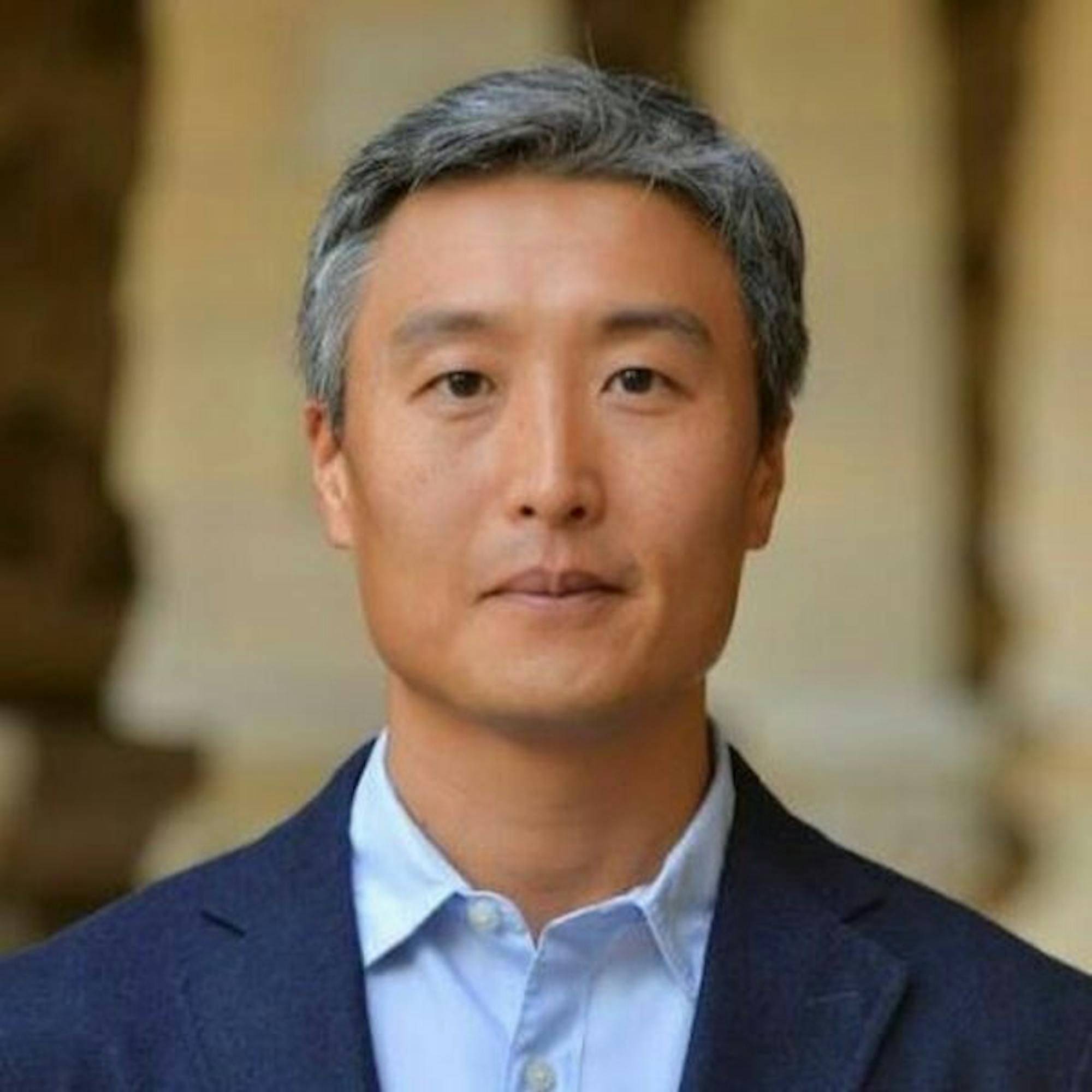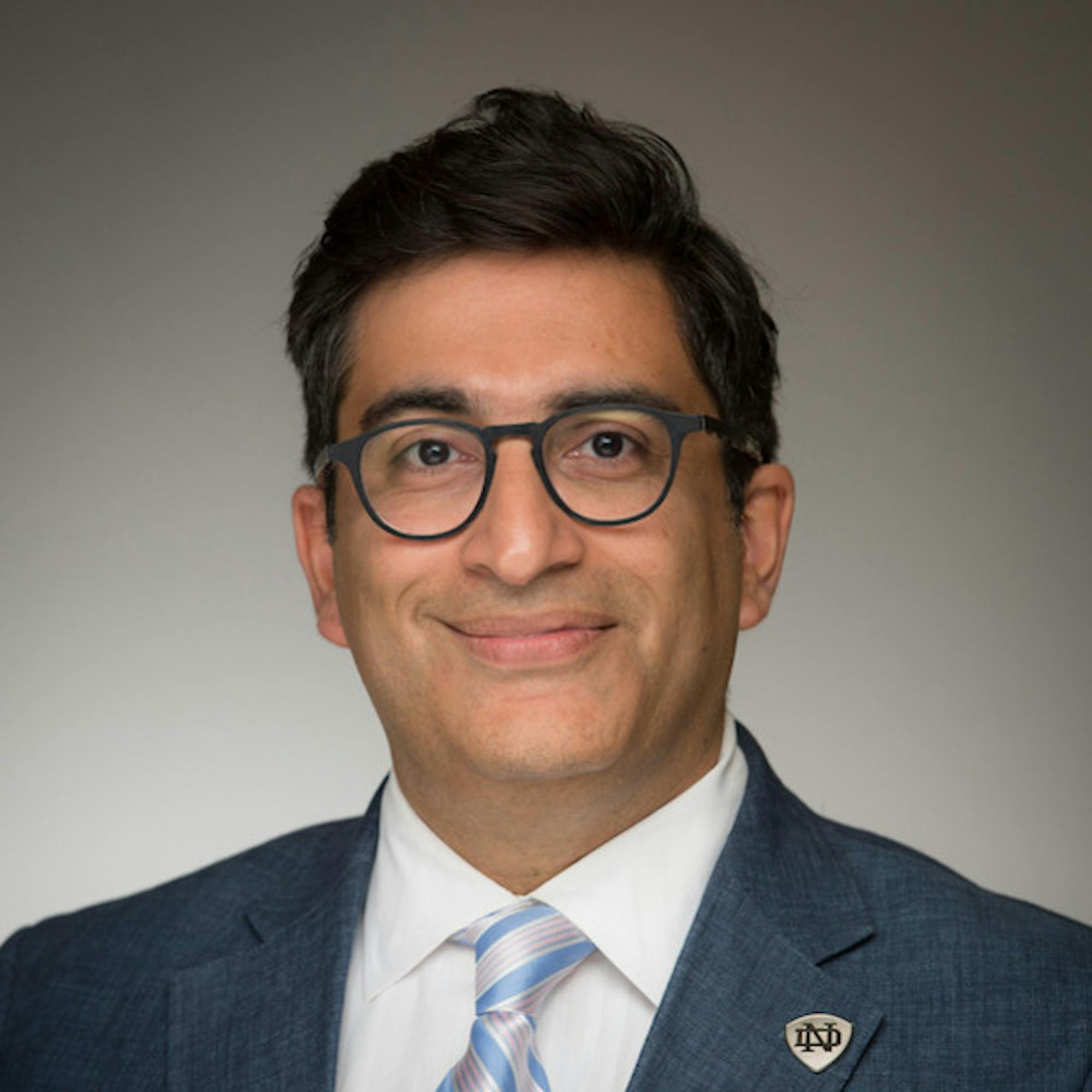Artificial intelligence (AI) may seem like a distant technology, confined to Terminator-style sci-fi stories for the foreseeable future. But the rapid advances in AI capabilities, as exhibited recently with tools like DALL-E and ChatGPT, demonstrate that AI is already here and impacting our everyday lives. While AI holds the promise of advancing society and shaping the world for the better, it also has the potential to be harmful or outright destructive. So, ensuring responsible AI deployment is imperative to securing a flourishing future for humanity, or securing a future for humanity at all.
In this inaugural edition of From the Future — a new series highlighting transformative research occurring at Notre Dame — we profile three researchers who are investigating ways to tackle philosophical, political and practical challenges as humans attempt to implement AI into our society.
Novel frameworks for AI philosophy:
Carolina Villegas-Galaviz, Postdoctoral Research Associate, Technology Ethics Center

As a philosophy student in her native Spain, Carolina Villegas-Galaviz discovered the 20th-century German philosopher Hans Jonas. Jonas observed that in approaching philosophical issues with technology, people were trying to apply theories from thousands of years ago. These ancient theories, Jonas argued, were no longer applicable. Instead, humanity needs new ethics for the technological age.
“When I heard his idea, I knew it was true,” Villegas-Galaviz said. “Right now what we need to do is to adapt the moral frameworks of the past that Aristotle and others more than 2,000 years ago proposed, and relate those to the new era.”
Among the myriad technologies that permeate modern society, AI presents perhaps the most profound philosophical problems. As a postdoctoral research associate at the Notre Dame Technology Ethics Center, Villegas-Galaviz is moving beyond standard approaches like deontology or epistemology and employing novel ethical frameworks to meet the unique demands of AI.
One of Villegas-Galaviz’s main areas of research is the “ethics of care.” She finds four aspects of the ethics of care framework especially useful for thinking about AI.
First, ethics of care is grounded in a view of individuals as existing in a web of interdependent relationships, and these relationships must be considered when designing AI systems.
Second, ethics of care emphasizes the importance of context and circumstances. For Villegas-Galaviz, this means that AI algorithms shouldn’t be applied universally, but should be tailored with the local culture, customs and traditions in mind.
Third, Villegas-Galaviz notes that humans should be aware of the vulnerabilities of certain people or populations and ensure that AI does not exploit these vulnerabilities, purposely or inadvertently.
Lastly, ethics of care holds that giving a voice to everyone is essential. Understanding all perspectives is imperative for AI, a technology that promises to be truly universal.
Beyond the ethics of care, Villegas-Galaviz received a grant from Microsoft to study the intersection of AI and empathy. Her research so far has focused on how empathy relates to the problem of “moral distance,” where concern for others diminishes when people don’t have to directly interact with those affected by their actions. This is a pertinent problem for AI, where developers deploy algorithms in a detached fashion.
“It's interesting to see how empathy can help to ameliorate this problem of moral distance,” Villegas-Galaviz said. “Just to know there’s a problem with lack of empathy with AI … we’ll be in line to solve it. Those who design, develop and deploy [AI] will know that ‘I need to work on this.’”
Villegas-Galaviz says her research is grounded in a critical approach to AI. However, she noted that this does not mean she is against AI; she believes humans can solve the philosophical issues she is studying.
“I always try to say that AI is here to stay and we need to make the best out of it,” Villegas-Galaviz said. “Having a critical approach does not mean being a pessimist. I am optimistic that we can make this technology better.”
Finding balance with AI regulation:
Yong Suk Lee, Assistant Professor of Technology, Economy and Global Affairs, Keough School of Global Affairs

While promoting new philosophical frameworks for AI will help ensure responsible use to an extent, humanity will likely need to create concrete legal strategies to regulate AI.
Such is the research focus for Dr. Yong Suk Lee, Assistant Professor of Technology, Economy and Global Affairs in the Keough School. Lee notes that the rapid progress AI has made in recent years is making governance challenging.
“The pace of technological development is way ahead and people, the general public especially, but also people in governance — they’re not aware of what these technologies are and have little understanding,” Lee said. “So with this wide discrepancy between how fast technology is evolving in the applications and the general public not even knowing what this is — with this delay, I think it’s a big issue.”
An economist by training, Lee’s research has primarily focused on the effects of AI on the business sector.
In a 2022 study, Lee and fellow researchers conducted a randomized control trial where they presented business managers with proposed AI regulations. The goal was to determine how regulations influence managers’ views on AI ethics and adoption.
The study concluded that “exposure to information about AI regulation increases how important managers consider various ethical issues when adopting AI, but increases in manager awareness of ethical issues are offset by a decrease in manager intent to adopt AI technologies.”
Lee is currently researching the ramifications of AI adoption on jobs in the banking industry.
To some extent, Lee’s research aligns with the common assumption that “AI is stealing our jobs.” He is finding that as banks adopt AI, demand for “front-end” jobs like tellers decreases. However, demand for analysts and other technical roles is actually increasing. So, while AI isn’t taking all of our jobs just yet, according to Lee, “it is definitely changing the skills demanded of workers.”
In thinking about what successful AI governance might look like, Lee considers two facets to be critical. For one, Lee would like to see more up-front regulation or supervision determining how AI is deployed.
“I think there needs to be some way where regulation or agencies or academia can play a role in thinking about whether it’s good for these types of technologies to be out in the public,” Lee said.
However, Lee doesn’t want regulation to stifle innovation. Lee noted that AI is a geopolitical issue as the US, China and other countries “race” to develop advanced AI faster than others.
“With this in mind, you think ‘okay, we do want to regulate to some degree, but also we don’t want to stifle innovation,’” Lee said. “So how we balance that I think is going to be a key thing to consider going forward.”
Though the challenges are significant, Lee feels that successful AI regulation can be achieved.
“I think we will find a way,” Lee said. “There’s going to be trial and error. But we won’t let AI destroy humanity.”
Collaborating to create AI for good:
Nitesh Chawla, Frank M. Freimann Professor of Computer Science and Engineering, College of Engineering; Director, Lucy Family Institute for Data and Society

Assuming humans overcome the above philosophical and political issues (and, of course, that AIs and other advancements don’t destroy humanity), what is the potential for AI in helping our society?
Nitesh Chawla, Frank M. Freimann Professor of Computer Science and Engineering and Director of the Lucy Family Institute for Data and Society, is focused on finding applications where AI can be used for good.
“We are advancing the field [of AI], we are developing new algorithms, we are developing new methods, we are developing new techniques. We’re really pushing the knowledge frontier,” Chawla said. “However, we also ask ourselves the question: how do we take the big leap, the translational leap? Can we imagine these innovations in a way that we can implement them, translate them to the benefit of a single person’s life or to the benefit of a community?”
For Chawla, the quest to find the most impactful AI applications is not, and should not be, an endeavor only for computer scientists. Though a computer scientist himself, Chawla believes that advancing AI for good is an interdisciplinary effort.
“A lot of these societal challenges are at the intersection of domains where different faculties or different expertise have to come together,” Chawla said. “It could be a social science piece of knowledge, it could be a humanist approach ... and then the technologist could say, ‘let me take that into account as I’m developing the technology so the end user, the person I’m interested in making an impact for, actually benefits from it.’”
Embracing this interdisciplinary mindset, Chawla’s work at the Lucy Family Institute involves a range of applications in a variety of locations.
Chawla discussed a project here in South Bend, where the Institute is working with community partners and using AI to help address childhood lead poisoning. In another health-related study, AI is being used to analyze and propose solutions for healthcare disparities in Mexico. Further south in Colombia, the Lucy Family Institute and the Kroc Institute for Peace Studies have teamed up to apply AI toward understanding peace accords processes.
“The institute is committed 200 percent to leveraging data, AI [and] machine learning towards the benefit of society and enabling teams of faculty, students and staff on campus to get together to take on some of these wicked problems and address them,” Chawla said.
Like Villegas-Galaviz and Lee, Chawla is optimistic about AI. Chawla envisions a future where humans don’t just passively deploy AI, but where humans and AIs work together to solve the world’s most pressing problems.
“It’s going to be a human-machine collaboration, where the humans would still be necessary for certain higher-order decision-making, but the machine just makes it easier,” Chawla said. “It’s going to be a partnership, in many ways.”
Chawla said that AI will not be a substitute for human work.
“I don’t believe [AI] is going to be displacing mankind,” Chawla added. “I believe that top scholars and practitioners can come together to enable progress in technology while also thinking about how we democratize its use and access in an ethical way.”
Contact Spencer Kelly at skelly25@nd.edu.









